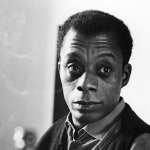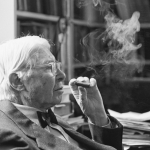The unicorn is an easy prey: its horn
in the maiden’s lap is an obvious
twist, a tamed figure—like the hawk
that once roamed free, but sits now, fat and hooded,
squawking on the hunter’s wrist. It’s easy
to catch what no longer captures
the mind, long since woven in,
a faded tapestry on a crumbling wall
made by the women who wore keys
at their waists and in their sleep came
hot dreams of wounded knights left bleeding
in their care, who would wake the next morning
groaning from the leftover lance in the groin,
look up into the round blond face beaming down
at them thinking "mine," and say: "angel."
Such beasts are easy to catch; their dreams
betray them. But the hard prey is the one
that won’t come bidden.
By these signs you will know it:
when you lift your lure
out of the water, the long plastic line
will be missing its end: the lure and the hook
will be gone, and the line will swing free
in the air, so light it will be without
bait or its cunning
sharp curl of silver. Or when you pull
your net from the stream, it will be eaten
as if by acid, its fine mesh sodden shreds.
Or when you go at dawn to check your traps,
their great metal jaws will be wrenched
open, the teeth blunt with rust
as if they had lain for years in the rain.
Or when the thunderstorm suddenly breaks
in the summer, next morning
the computer’s memory will be blank.
Look then for the blank card, the sprung trap,
the net’s dissolve, the unburdened
line that swings free in the air.
There. By day, go empty-handed to the hunt
and come home the same way
in the dark.




















Comment form: